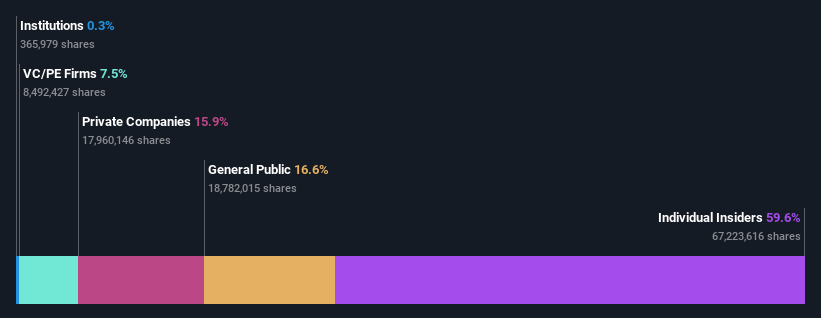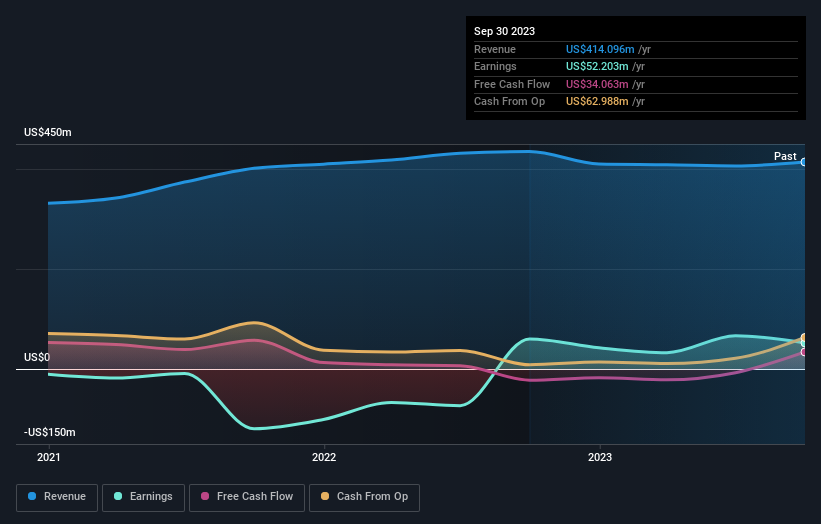- United States
- /
- Pharma
- /
- OTCPK:PROC.F
Insiders the biggest winners as Procaps Group S.A.'s (NASDAQ:PROC) market cap rises to US$125m

Key Insights
- Procaps Group's significant insider ownership suggests inherent interests in company's expansion
- The top 3 shareholders own 60% of the company
- Ownership research, combined with past performance data can help provide a good understanding of opportunities in a stock
To get a sense of who is truly in control of Procaps Group S.A. (NASDAQ:PROC), it is important to understand the ownership structure of the business. And the group that holds the biggest piece of the pie are individual insiders with 60% ownership. That is, the group stands to benefit the most if the stock rises (or lose the most if there is a downturn).
As a result, insiders scored the highest last week as the company hit US$125m market cap following a 33% gain in the stock.
Let's take a closer look to see what the different types of shareholders can tell us about Procaps Group.
View our latest analysis for Procaps Group

What Does The Lack Of Institutional Ownership Tell Us About Procaps Group?
Institutional investors often avoid companies that are too small, too illiquid or too risky for their tastes. But it's unusual to see larger companies without any institutional investors.
There are many reasons why a company might not have any institutions on the share registry. It may be hard for institutions to buy large amounts of shares, if liquidity (the amount of shares traded each day) is low. If the company has not needed to raise capital, institutions might lack the opportunity to build a position. Alternatively, there might be something about the company that has kept institutional investors away. Procaps Group's earnings and revenue track record (below) may not be compelling to institutional investors -- or they simply might not have looked at the business closely.

Procaps Group is not owned by hedge funds. Our data shows that Ruben Minski is the largest shareholder with 28% of shares outstanding. The second and third largest shareholders are Jose Gontovnik and Deseja Trust, with an equal amount of shares to their name at 16%.
After doing some more digging, we found that the top 3 shareholders collectively control more than half of the company's shares, implying that they have considerable power to influence the company's decisions.
Researching institutional ownership is a good way to gauge and filter a stock's expected performance. The same can be achieved by studying analyst sentiments. Our information suggests that there isn't any analyst coverage of the stock, so it is probably little known.
Insider Ownership Of Procaps Group
The definition of company insiders can be subjective and does vary between jurisdictions. Our data reflects individual insiders, capturing board members at the very least. The company management answer to the board and the latter should represent the interests of shareholders. Notably, sometimes top-level managers are on the board themselves.
Most consider insider ownership a positive because it can indicate the board is well aligned with other shareholders. However, on some occasions too much power is concentrated within this group.
Our information suggests that insiders own more than half of Procaps Group S.A.. This gives them effective control of the company. Given it has a market cap of US$125m, that means they have US$75m worth of shares. Most would be pleased to see the board is investing alongside them. You may wish todiscover (for free) if they have been buying or selling.
General Public Ownership
With a 17% ownership, the general public, mostly comprising of individual investors, have some degree of sway over Procaps Group. While this group can't necessarily call the shots, it can certainly have a real influence on how the company is run.
Private Equity Ownership
Private equity firms hold a 7.5% stake in Procaps Group. This suggests they can be influential in key policy decisions. Sometimes we see private equity stick around for the long term, but generally speaking they have a shorter investment horizon and -- as the name suggests -- don't invest in public companies much. After some time they may look to sell and redeploy capital elsewhere.
Private Company Ownership
It seems that Private Companies own 16%, of the Procaps Group stock. Private companies may be related parties. Sometimes insiders have an interest in a public company through a holding in a private company, rather than in their own capacity as an individual. While it's hard to draw any broad stroke conclusions, it is worth noting as an area for further research.
Next Steps:
I find it very interesting to look at who exactly owns a company. But to truly gain insight, we need to consider other information, too. Be aware that Procaps Group is showing 4 warning signs in our investment analysis , and 2 of those are concerning...
If you would prefer check out another company -- one with potentially superior financials -- then do not miss this free list of interesting companies, backed by strong financial data.
NB: Figures in this article are calculated using data from the last twelve months, which refer to the 12-month period ending on the last date of the month the financial statement is dated. This may not be consistent with full year annual report figures.
New: Manage All Your Stock Portfolios in One Place
We've created the ultimate portfolio companion for stock investors, and it's free.
• Connect an unlimited number of Portfolios and see your total in one currency
• Be alerted to new Warning Signs or Risks via email or mobile
• Track the Fair Value of your stocks
Have feedback on this article? Concerned about the content? Get in touch with us directly. Alternatively, email editorial-team (at) simplywallst.com.
This article by Simply Wall St is general in nature. We provide commentary based on historical data and analyst forecasts only using an unbiased methodology and our articles are not intended to be financial advice. It does not constitute a recommendation to buy or sell any stock, and does not take account of your objectives, or your financial situation. We aim to bring you long-term focused analysis driven by fundamental data. Note that our analysis may not factor in the latest price-sensitive company announcements or qualitative material. Simply Wall St has no position in any stocks mentioned.
About OTCPK:PROC.F
Procaps Group
Develops, produces, and markets pharmaceutical solutions worldwide.
Very low with weak fundamentals.
Similar Companies
Market Insights
Community Narratives





